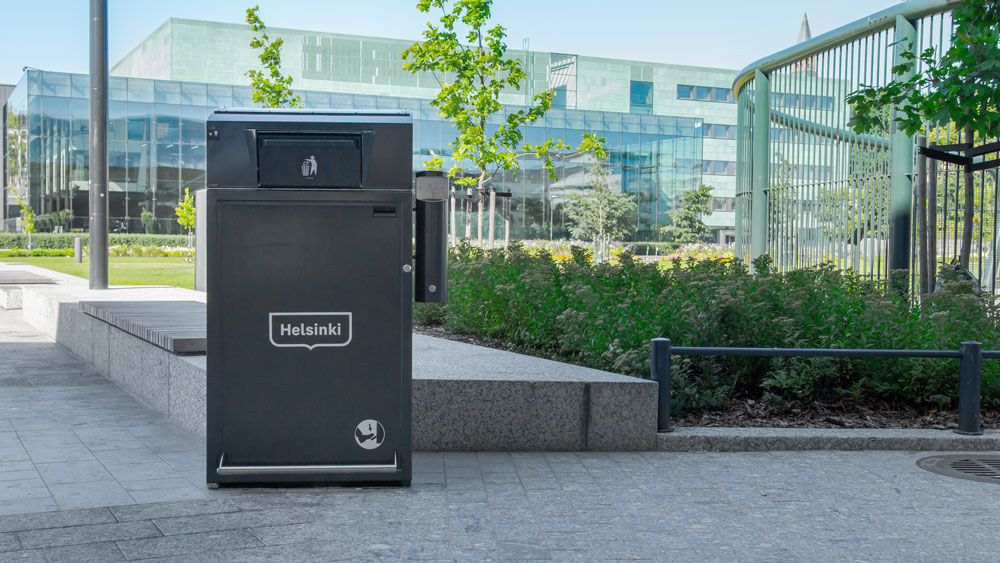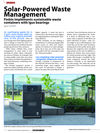Solar-Powered Waste Management
Finbin implements sustainable waste containers with igus bearings
An overflowing waste bin in a park: pizza boxes piled up, coffee cups, napkins and beer cans on the ground. Cities all over Europe have been fighting against such a deluge of waste for years. Corona exacerbates the problem because people spend more time outdoors. “With classic rubbish bins, waste management in most cities is now reaching its limits. Many metropolitan areas in Finland, for example, had to empty public waste bins up to four times a day even before the pandemic,” said Antti Kinnunen, marketing manager at Finbin. The Finnish company’s answer: a waste bin called CitySolar, which compresses waste and thereby has a much higher capacity. A waste bin that is connected to the Internet and triggers an emptying before reaching the maxi mum fill level. “With CitySolar, we are making a contribution to reducing disagreeable waste scenes in cities and improving the CO2 balance in waste management. Up to four out of five trips can be avoided with the networked waste bin,” Kinnunen added.
Less emptying: solar-powered compactor compresses waste
Visually, CitySolar is reminiscent of the robot R2-D2 from Star Wars — only somewhat larger, more angular and less noisy. Its operation is simple: a passer-by opens the waste flap by hand or by foot. Once the flap has closed, an electric press compresses the waste. It is done so effectively that a container with a capacity of 240 liters can hold 1,500 liters of waste — with a total weight of up to 600 kilograms. The waste bin can do this work anywhere, independent of the public power grid. Because the engineers have installed solar panels on the roof. In addition, a lithium-ion battery that stores power for cloudy periods and the night. This means that energy is available for the waste compactor around the clock. Indoors, CitySolar is not dependent on solar energy. The waste bin can be connected to the conventional power grid here.
Maintenance-free components
To increase the sustainability of the novel waste bins further, the engineers have made every effort to use components that do not require maintenance. After all, every maintenance operation causes CO2 emissions — solely through travel to the site. Finding such compo nents was not always easy. An example: the plain bearings for the mechanics of the press and the skirting board. Clas sic bearings made of metal were out of the question for the job. Why? First, because there would be a risk of corrosion with high humidity. Second, because the lubrication of metal bearings can lead to several problems. It would combine with dust and dirt and, over time, become a paste that reduces the bearing’s sliding ability, making the system less smooth and, in the worst case, leading to failure. To avoid these problems, the engineers set out to find lubrication-free plain bearings made of high-performance plastic. “We looked at bearings from different manufacturers thoroughly,” Kinnunen recalled. “Durability and reliability were the main criteria and the reason why we chose plain bearings from igus.”
Durability proven on the test rig
Iglidur G plain bearings (GFM-1214 12) are used in the mechanics of the pressing plant. A test in the igus in house laboratory, the largest test lab oratory in the industry, proves how wear-resistant the bearings are compared to classic metal bearings. In the test, the bearings were pivoted on a gas-nitrided, St52 steel shaft — with a load of 30 Mpa and a speed of 0.01 meters per second. “In the case of the metal bearings, the sliding layer was already worn after 60,000 cycles,” said Stefan Loockmann Rittich, head of the iglidur bearings business unit. “The iglidur G plain bearings, on the other hand, showed almost no signs of wear even after 200,000 cycles. They are ideally suited for reliable and maintenance-free use in wind and weather for many years.” The plain bearings are therefore also installed in the skirting board and in the waste flap — here in combination with double flange bearings of the iglidur M250 series.
Waste bin reports filling level via the Internet
However, the electric waste bin from Finbin is not only low maintenance, but also smart. Sensors are installed inside the container to measure the fill level. In addition, a SIM card connects CitySolar to the Internet. The bin can continuously transmit the fill level to FinbinCare. The cloud-based waste management software works with GPS tracking technology and shows waste companies what the fill level of individual bins is on a map. Via an API interface, the waste bins can alternatively be connected to waste management systems.
“CitySolar’s fill level information is based on a patented measuring system developed in-house, which is one of the most accurate systems on the mar ket,” said Kinnunen. “Thanks to this in formation, companies can deploy personnel resources in a more targeted manner, and unnecessary trips to almost empty bins are a thing of the past. So are bins that overflow.” Finbin’s internet-linked waste bins can be admired in more and more cities — no longer just in Scandinavian cities such as Oslo, Helsinki and Finland, but now also in Hvar in Croatia and Verona in Italy. Cities are flexible when it comes to costs. You can either buy CitySolar for around 5,000 euros each or rent it for a monthly fee. Finbin therefore offers enough flexibility for further applications. “The facilities make them ideal for events or festivals, for example,” said Yrjo Ojanen, the de signer of the Finbin. “They can actually make the world a bit greener.”





